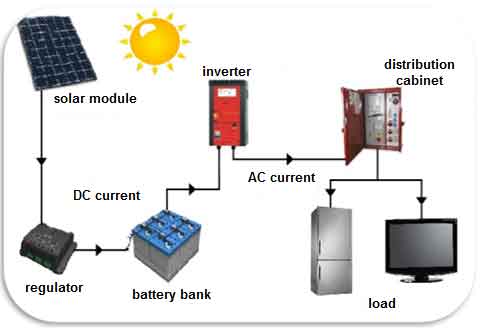
The revolutionary impact of off grid solar systems is multifaceted, touching on economic, environmental, social, and technological aspects:
- Economic Empowerment: Off grid solar system can drastically reduce electricity bills or eliminate them entirely, providing significant savings for individuals and communities. This is particularly impactful in regions with high energy costs. Moreover, these systems often lead to job creation in the areas of installation, maintenance, and manufacturing, boosting local economies.
- Environmental Sustainability: Off grid solar system is clean and renewable, making off-grid systems key players in reducing reliance on fossil fuels and lowering carbon emissions. This shift is crucial in combating climate change and preserving natural resources for future generations.
- Enhanced Access to Education and Healthcare: In many remote areas, the lack of reliable electricity hinders education and healthcare. Off grid solar system can power schools, allowing for digital learning tools and extended study hours, and enable the operation of essential medical equipment in clinics, improving healthcare outcomes.
- Rural and Remote Area Development: Off grid solar system is game-changers for remote areas where grid extension is economically unfeasible. They facilitate the electrification of these regions, driving overall development, improving living standards, and reducing urban migration.
- Technological Innovation: The growing demand for Off grid solar system has spurred rapid advancements in related technologies, including more efficient solar panels, advanced battery storage systems, and smart energy management. These innovations benefit not just off-grid users but the broader energy sector.
- Increased Energy Security and Independence: Off grid solar system provide energy security, especially in areas prone to power outages or in countries with unstable energy supplies. Energy independence is also a strategic advantage for individuals and communities wanting to reduce their reliance on external energy sources.
- Community Empowerment and Social Cohesion: In many cases, the implementation of off grid solar system is a community effort, which can strengthen community bonds and empower residents through shared projects and goals.
- Promoting Sustainable Lifestyles: Living off-grid often encourages more sustainable and conscious consumption habits. Users tend to become more aware of their energy usage and adopt more energy-efficient practices.
- Global Health Improvements: Off grid solar system can replace harmful energy sources like diesel generators and kerosene lamps, which are prevalent in off-grid areas. This shift can have a significant positive impact on public health by reducing air pollution and associated respiratory problems.
- Innovation in Decentralized Energy Systems: Off grid solar system a shift towards decentralized energy systems, which can be more resilient to systemic risks and adapt better to local conditions and needs.
- Potential for Scalability and Flexibility: Off-grid systems can start small and expand as needs grow, making them adaptable to a wide range of applications, from single households to entire communities.
The revolutionary impact of off grid solar system is profound and wide-reaching. It’s not just about providing electricity; it’s about catalyzing positive change in numerous aspects of life, from economic development to environmental sustainability, and from social empowerment to technological innovation.
